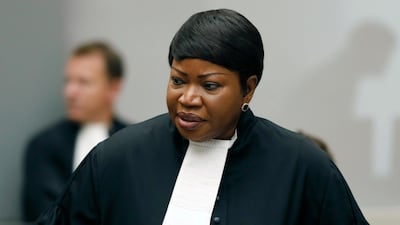The International Criminal Court ruled Friday that it had jurisdiction over the situation in the occupied Palestinian territories, paving the way for the tribunal to open a war crimes investigation.
ICC Prosecutor Fatou Bensouda had asked the court for its legal opinion on whether its reach extended to areas occupied by Israel, after announcing in December 2019 that she wanted to start a full probe.
Israeli Prime Minister Benjamin Netanyahu denounced the ICC as a "political body" while the United States said it had "serious concerns" over the decision.
The Palestinians called it a "victory for law".
The ICC said in a statement that judges had "decided by majority that the court's territorial jurisdiction in the situation in Palestine, a state party to the ICC Rome Statute, extends to the territories occupied by Israel since 1967, namely Gaza and the West Bank, including East Jerusalem."
Palestine is a state party to the court set up in the Netherlands in 2002 to try the world's worst crimes, but Israel is not.
The court added that its decision was not a ruling on Palestinian "statehood", but that as a state party to the court, it should be treated in line with a UN General Assembly statement of the "right of the Palestinian people to self-determination".
"The chamber is neither adjudicating a border dispute under international law nor prejudging the question of any future borders" but made the decision for the "sole purpose of defining the court's territorial jurisdiction", it said.
The administration of former US president Donald Trump slapped sanctions on the prosecutor and another senior court official in September.
The US, which is not a member of the court, enacted the measures after earlier visa bans on Ms Bensouda and others failed to head off the court's war crimes probe into US military personnel in Afghanistan.
But the US has also cited the court's treatment of its ally, Israel.
Mr Netanyahu slammed Friday's decision.
"The tribunal has, once again, proved that it is a political body and not a judicial institution," Mr Netanyahu said in a statement, and added that the decision undermined the "right of democracies to defend themselves against terrorism".
Palestinian civil affairs minister Hussein Al Sheikh said on Twitter that the ruling was a "victory for law, justice, liberty and moral values in the world."
The US State Department said Israel should not be bound by the court as it is not a member.
In a statement, US State Department spokesman Ned Price said the Biden administration is reviewing the decision. “We’re aware of it, and reviewing it,” Mr Price said.
But the US official also echoed concerns. “We share the goals of the ICC to create accountability for the worst crimes against humanity, but we have serious concerns about the ICC's attempts to exercise its jurisdiction over Israeli personnel.”
The spokesman also added the US traditional stance that “the court's jurisdiction should be reserved for countries that consent to or that are referred to by the UN Security Council.”
Human Rights Watch however said the ruling was "pivotal", adding that it was "high time that Israeli and Palestinian perpetrators of the gravest abuses" should face justice.
"The ICC's decision finally offers victims of serious crimes some real hope for justice after a half century of impunity," Balkees Jarrah, associate international justice director at organisation, said in a statement.
Ms Bensouda called for the full investigation following a five-year preliminary probe that began with the 2014 war in Gaza.
At the time, she said she could open a probe on her own authority but wanted to ask the court about the territory it covers due to the "unique and highly contested legal and factual issues attaching to this situation."
Ms Bensouda, who steps down in June, has urged the Biden administration to lift US sanctions.
In a separate case, the court in September dismissed an appeal against a decision not to begin probe into Israel's involvement in a deadly raid on an aid flotilla to Gaza in 2010.

